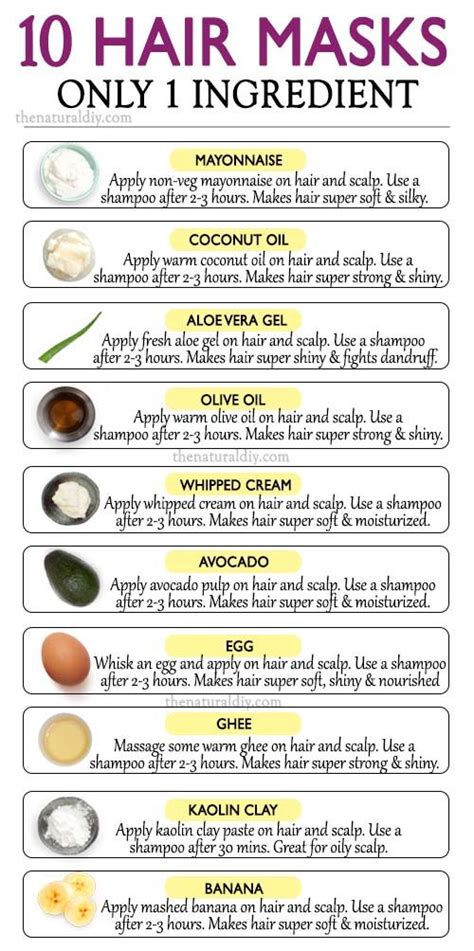Introduction
Nourishing your hair is essential for maintaining its health, luster, and vibrancy. Commercial hair care products often contain harsh chemicals and artificial ingredients that can damage the hair and scalp. Home hair masks, on the other hand, offer a natural and economical way to treat your hair while avoiding potential side effects.

Benefits of Home Hair Masks
- Customization: Home hair masks allow you to tailor the ingredients to your specific hair needs and preferences.
- Natural ingredients: These masks use natural ingredients such as fruits, vegetables, and oils, which are rich in vitamins, minerals, and antioxidants.
- Cost-effective: Home hair masks are significantly cheaper than store-bought products.
- Free from harmful chemicals: They are free from sulfates, parabens, and phthalates, which can cause irritation and damage hair.
- Promote hair health: Home hair masks nourish and strengthen the hair, reduce frizz, and stimulate scalp circulation.
Types of Home Hair Masks
There are various types of home hair masks, each formulated for specific hair concerns.
Moisturizing Masks
- Avocado Honey Mask: Blend 1 ripe avocado, 1/2 cup honey, and 2 tablespoons olive oil.
- Coconut Milk Mask: Combine 1 cup coconut milk, 2 tablespoons argan oil, and a few drops of lavender essential oil.
Strengthening Masks
- Egg Protein Mask: Whisk together 2 eggs, 2 tablespoons Greek yogurt, and 1 tablespoon honey.
- Banana Oat Mask: Mash 1 ripe banana, 1/2 cup oats, and 2 tablespoons coconut oil.
Clarifying Masks
- Apple Cider Vinegar Rinse: Dilute 1 cup apple cider vinegar in 2 cups water and rinse through the hair.
- Bentonite Clay Mask: Mix 2 tablespoons bentonite clay with enough water to form a paste.
How to Make a Home Hair Mask
Creating a home hair mask is simple and involves a few basic steps:
1. Choose ingredients: Select the ingredients that align with your hair concerns.
2. Combine Ingredients: Mix the ingredients thoroughly until a smooth paste is formed.
3. Apply to hair: Apply the mask to damp hair, avoiding the scalp unless necessary.
4. Cover with a cap: Wrap your hair with a shower cap or a towel to prevent the mask from drying out.
5. Leave in: Allow the mask to sit for the recommended time, typically 30 minutes to 1 hour.
6. Rinse and style: Rinse the mask out with warm water and shampoo your hair as usual.
Tips and Tricks
- Patch test the mask on a small area of skin before applying to the entire head.
- Use ripe fruits and vegetables for optimal nutrient content.
- Warm the mask slightly before applying to enhance penetration.
- Adjust the consistency of the mask by adding more or less water as needed.
- Leave the mask in overnight for a deeper conditioning treatment.
Pros and Cons of Home Hair Masks
Pros:
- Natural and cost-effective
- Customizable to specific hair needs
- Free from harsh chemicals
- Promote hair health and vitality
Cons:
- May require multiple treatments for visible results
- Can be messy to apply
- May not be suitable for all hair types
Tables:
Table 1: Benefits of Home Hair Masks by Ingredient
| Ingredient | Benefits |
|---|---|
| Avocado | Moisturizes and nourishes |
| Honey | Antibacterial and anti-inflammatory |
| Coconut Milk | Strengthens and repairs |
| Argan Oil | Rejuvenates and protects |
| Eggs | Rich in protein and strengthens hair |
| Greek Yogurt | Anti-frizz and adds volume |
| Apple Cider Vinegar | Clarifies and balances pH |
| Bentonite Clay | Draws out impurities and cleanses |
Table 2: Types of Home Hair Masks by Hair Concern
| Hair Concern | Type of Mask |
|---|---|
| Dryness and Frizz | Moisturizing |
| Thinning and Breakage | Strengthening |
| Product Buildup | Clarifying |
| Dandruff | Anti-fungal |
| Color Damage | Protective |
Table 3: Step-by-Step Guide to Making a Home Hair Mask
| Step | Instructions |
|---|---|
| 1 | Choose ingredients |
| 2 | Blend or mix ingredients |
| 3 | Apply to damp hair |
| 4 | Cover hair and leave in |
| 5 | Rinse and shampoo |
Table 4: Tips for Creating and Using Home Hair Masks
| Tip | Benefit |
|---|---|
| Use ripe fruits and vegetables | Higher nutrient content |
| Warm the mask slightly | Enhances penetration |
| Adjust consistency with water | Customizable |
| Leave in overnight | Deeper conditioning |
| Store leftovers in the refrigerator | Prolongs shelf life |
Conclusion
Home hair masks offer a natural and effective approach to hair care. By utilizing simple ingredients found in your kitchen, you can create customized treatments that address your specific hair concerns. With regular use, home hair masks can help restore the health, beauty, and vitality of your hair. Remember to consider your hair type and experiment with different ingredients to find the optimal recipe for your needs.
